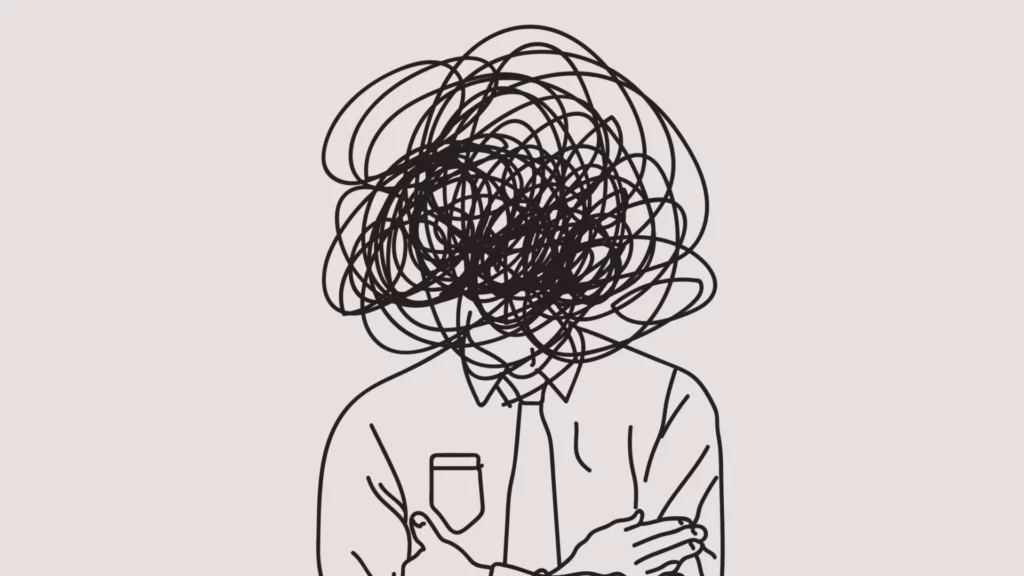Depression is a serious mental illness that can impact anyone, regardless of age, race, or gender. The good news is that depression is highly treatable, and most people who receive treatment experience a significant improvement in their quality of life. In this blog post, we will discuss the symptoms of clinical depression and how to get help if you think you may be suffering from it.
Contents
What Is Clinical Depression?
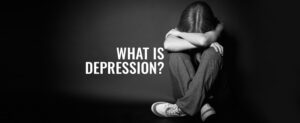 These days, depression is a synonym for feeling “down.” But that’s not an accurate portrayal of what clinical depression actually is. Depression is a real and serious mental illness that can cause a variety of physical and emotional symptoms. These symptoms can interfere with your ability to work, study, eat, sleep, and enjoy activities you used to love. Clinical depression is not simply a case of the “blues.” It is a serious condition that requires treatment.
These days, depression is a synonym for feeling “down.” But that’s not an accurate portrayal of what clinical depression actually is. Depression is a real and serious mental illness that can cause a variety of physical and emotional symptoms. These symptoms can interfere with your ability to work, study, eat, sleep, and enjoy activities you used to love. Clinical depression is not simply a case of the “blues.” It is a serious condition that requires treatment.
The reason it is called “clinical” depression is that it is a diagnosable mental disorder. It is more than just feeling down or going through a rough patch. Clinical depression is characterized by certain symptoms that last for at least two weeks. It is severe enough to interfere with our physiology. This means that it physically changes how our brains function. It also interferes with our biological, cognitive, and hormonal regulations. Clinical depression is not simply a case of “the blues” or feeling down for a few days. It is a serious mental illness that requires treatment.
What Are The Clinical Depression Symptoms?
The main key to understanding clinical depression is recognizing the symptoms. Clinical depression symptoms can vary from person to person, but there are some common signs to look out for.
Decreased Interests
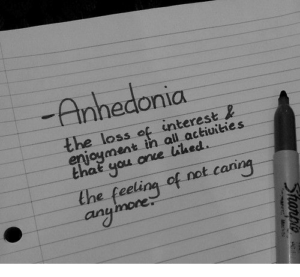 This is the first alarming sign that something might be wrong. It is not normal to suddenly lose interest in the activities and hobbies you once loved. This includes things like sex, work, school, or spending time with friends and family. When someone is clinically depressed, they often withdraw from social activities and become isolated.
This is the first alarming sign that something might be wrong. It is not normal to suddenly lose interest in the activities and hobbies you once loved. This includes things like sex, work, school, or spending time with friends and family. When someone is clinically depressed, they often withdraw from social activities and become isolated.
The key reason this is such an alarming sign is that it is usually accompanied by a loss of pleasure. This means that the things you used to enjoy no longer bring you happiness or satisfaction. For example, you might love spending time with your friends, but if you’re depressed, hanging out with them might not make you feel better.
Anhedonia is the clinical term for this loss of pleasure. It’s one of the most common and defining symptoms of depression. It is not a separate condition, but rather a symptom of depression.
Changes in appetite
Food and appetite are closely linked to our mood. When we’re feeling down, we often lose our appetite or make poor food choices. On the other hand, when we’re happy and content, we tend to have a good appetite and make healthier food choices.
When someone is clinically depressed, they often experience changes in appetite. This can manifest as either a decrease or increase in appetite. People who are depressed often lose their appetite and eat less than usual. This can lead to weight loss. On the other hand, some people who are depressed overeat and gain weight.
When we are irregular with food, it is no surprise that our weight changes. However, for some people, these changes in appetite are not due to a change in eating habits. Rather, they are a symptom of depression.
Sleep disruptions
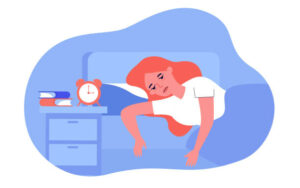 Just like appetite, sleep is another key component of life that is linked to our mood. When we’re happy, we tend to sleep well. But when we’re down or stressed, our sleep patterns are often disrupted.
Just like appetite, sleep is another key component of life that is linked to our mood. When we’re happy, we tend to sleep well. But when we’re down or stressed, our sleep patterns are often disrupted.
People who are clinically depressed often have trouble sleeping. This can manifest as either insomnia or hypersomnia. Insomnia is characterized by difficulty falling asleep or staying asleep. Hypersomnia is excessive sleeping. People with hypersomnia often sleep for long periods of time and still feel exhausted when they wake up. Even if one does sleep, the quality of sleep is often poor. This means that people with depression often wake up feeling tired and unrested.
Sleep disruptions are not only an inconvenience, but they can also take a toll on our physical and mental health. When we don’t get enough sleep, we’re more likely to get sick. We’re also more likely to have accidents and make mistakes. Sleep disruptions can also worsen the symptoms of depression.
Psychomotor disturbances
Let us start by dissecting the term “psychomotor.” The “psycho-” prefix refers to our mental state while the “motor” suffix refers to movement. So, psychomotor disturbances refer to changes in both our mental state and our level of activity.
People who are clinically depressed often have issues with psychomotor disturbances. This can manifest as either agitation or retardation. Agitation is an increase in activity. People who are agitated often feel restless and fidgety. They might pace back and forth or have a hard time sitting still. On the other hand, retardation is a decrease in activity. People who are retarded often feel sluggish and tired. They might have a hard time getting out of bed or completing tasks.
Psychomotor disturbances are often accompanied by changes in mood. For example, people who are agitated might be irritable and angry. People who are retarded might be sad and hopeless. These changes in activity level and mood can have a significant impact on our lives.
Fatigue
We all are familiar with the feeling of exhaustion even after a full night’s sleep. For some of us, this is just a part of life. But for people who are clinically depressed, fatigue is often more than just being tired. It is all-encompassing and can make even the simplest tasks seem impossible.
Fatigue is one of the most common symptoms of depression. It is often described as a feeling of being physically and mentally drained. People who are fatigued often have no energy or motivation. They might find it hard to concentrate or make decisions.
Fatigue can have a significant impact on our lives. It can make it hard to function at work, school, or home. It can also lead to accidents and mistakes. If you are feeling fatigued, it is important to talk to your doctor.
Emotional dysfunction
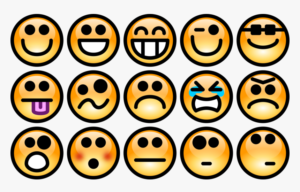 Depression is rightly categorized as a “mood disorder”. This is because one of the most common symptoms of depression is changes in mood. People who are depressed often have issues with emotional dysfunction.
Depression is rightly categorized as a “mood disorder”. This is because one of the most common symptoms of depression is changes in mood. People who are depressed often have issues with emotional dysfunction.
Emotional dysfunction refers to a wide range of emotions that are out of proportion to the situation. For example, someone might laugh uncontrollably at a funeral or get angry over something trivial.
People who are depressed also often have issues with their emotions. They might feel sad, empty, or hopeless. These feelings can be so intense that they interfere with our daily lives. The fluctuation of these moods is often what leads people to seek help.
Cognitive impairment
Cognition refers to our mental processes. This includes things like attention, memory, and decision-making. Cognitive impairment is a general term that refers to any problems with these mental processes.
People who are depressed often have difficulty concentrating or making decisions. They might have a hard time remembering things or completing tasks. These issues can make it hard to function at work, school, or at home. Cognitive impairment can also lead to accidents and mistakes.
Thoughts of death
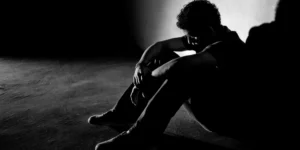 At the very last stage, people might start having thoughts of death or suicide. These thoughts can range from a general feeling that life is not worth living to specific plans about how and when to end their lives.
At the very last stage, people might start having thoughts of death or suicide. These thoughts can range from a general feeling that life is not worth living to specific plans about how and when to end their lives.
Thoughts of death or suicide are the most alarming and threatening symptoms of depression. These can manifest in ways that have the potential to be harmful to the person or those around them. If you or someone you know is having thoughts of death or suicide, it is important to seek immediate aid.
These are just some of the most common symptoms of clinical depression. If you are experiencing any of these symptoms, it is important to talk to your doctor. Depression is a serious condition that can have a negative impact on every aspect of our lives. But with treatment, it is possible to manage the symptoms and live a happy and healthy life.
What To Do If You Suspect These Symptoms?
Now that we know of the different symptoms, what can we do if we or our loved ones start to experience any of these? The very essential and careful thing to note is that everyone experiences these symptoms to some extent. That doesn’t necessarily mean that everyone who experiences them is clinically depressed.
A great number of people experience some form of depression at some point in their lives. In fact, it is estimated that one in every five people will experience clinical depression at some point in their lives. So, how can we tell if the symptoms are just a normal part of life or if they are something more? Here are some tips.
Seek a diagnosis
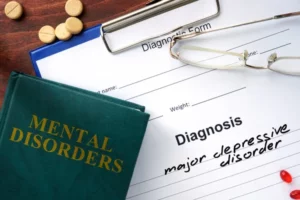 An official diagnosis can only be done by a mental health professional. If you suspect that you or someone you know might be depressed, the first step is to seek a diagnosis. This can be done by making an appointment with your doctor or mental health professional.
An official diagnosis can only be done by a mental health professional. If you suspect that you or someone you know might be depressed, the first step is to seek a diagnosis. This can be done by making an appointment with your doctor or mental health professional.
There are various types of interventions that a professional may make use of to diagnose depression. This might include a physical exam, a review of medical history, and a psychological evaluation. Once the diagnosis is made, the professional can then recommend the best course of treatment.
Monitor the symptoms
Another way to tell if the symptoms are just a normal part of life or if they are something more is to monitor them. This can be done by keeping track of how often the symptoms are occurring and how long they last. There are various ways to do so. You can try methods such as:
- Writing down the symptoms in a journal
- Tracking the symptoms on a calendar
- Using a symptom tracker app
If you notice that the symptoms are occurring more often or lasting longer, this might be an indication that they are something more than just a normal part of life. It is also important to keep in mind that the symptoms of depression can fluctuate. They might come and go or get worse over time. If you notice any changes in the frequency or severity of the symptoms, it is important to talk to your doctor.
Seek help
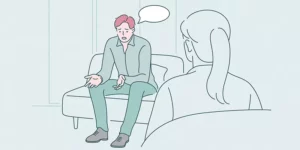 Help for depression is as important as seeking a diagnosis. If you are struggling with depression, it is important to seek help. There are various types of treatment available that can help manage the symptoms of depression. Treatment options include:
Help for depression is as important as seeking a diagnosis. If you are struggling with depression, it is important to seek help. There are various types of treatment available that can help manage the symptoms of depression. Treatment options include:
Therapy: Therapy is the process of talking to a therapist about your thoughts, feelings, and experiences. It can help you understand your depression and learn ways to cope with the symptoms. Some of the most common and effective therapy types for depression include:
- Cognitive-behavioral therapy
- Interpersonal therapy
- Psychodynamic therapy
- Clinical hypnosis
- Client-centered therapy
- Existential therapy
The right type of therapy for you will depend on your needs and preferences.
Medication: Prescription medication is also a common treatment option for depression. They work by altering the course of chemicals in the brain that are responsible for mood. Some of the most common types of medication used to treat depression include:
- Selective serotonin reuptake inhibitors (SSRIs)
- Serotonin and norepinephrine reuptake inhibitors (SNRIs)
- Atypical antidepressants
- Tricyclic antidepressants (TCAs)
- Monoamine oxidase inhibitors (MAOIs)
- Lithium
It is important to be in close contact with your doctor when taking medication for depression. This is because they can cause side effects and interact with other medications.
Hospitalization: In severely dangerous cases, people with depression may be hospitalized to keep them safe and prevent them from harming themselves. Hospitalization is also an option for people who are not responding to other forms of treatment. Some methods that are used to treat depression in a hospital setting include:
- Electroconvulsive therapy (ECT)
- Light therapy
- Transcranial magnetic stimulation (TMS)
- Deep brain stimulation (DBS)
- Vagus nerve stimulation (VNS)
- Relapse prevention and management
It is important to note that there is no one-size-fits-all approach to treatment. The best course of treatment will vary from person to person.
Practice self-care
Lastly, taking care of oneself is an important part of managing depression. This includes both physical and mental self-care. Some things that can be done to practice self-care include:
- Eating a healthy diet
- Exercising regularly
- Getting enough sleep
- Limiting alcohol consumption
- Practicing relaxation techniques such as yoga or meditation
- Spending time outside in nature
- Connecting with loved ones
- Doing things that make you happy
- Making time for hobbies and interests
When it comes to self-care, what works for one person might not work for another. It is important to find what works best for you and stick with it. Remember, self-care is an important part of healing.
No one deserves to suffer from depression. If you think you might be depressed, it is important to seek help. There are many resources available to help you get the treatment you need. Remember, you are not alone in this. Help is out there.
Conclusion
To conclude the above, we can say that depression is a serious mental illness that should not be taken lightly. If you think you might be depressed, it is important to seek help from a doctor or mental health professional. There are many effective treatment options available that can help manage the symptoms of clinical depression. With proper treatment, people can live happy and fulfilling lives.
If you or someone you know is looking for psychological help, Therapy Mantra is here for you. We are the leading providers of online therapy and counseling. Our team of highly trained and experienced therapists can provide assistance at the most affordable rates. Contact us today to learn more about our services. You may also visit our website to book an online therapy session or download our free Android or iOS app for more information.
